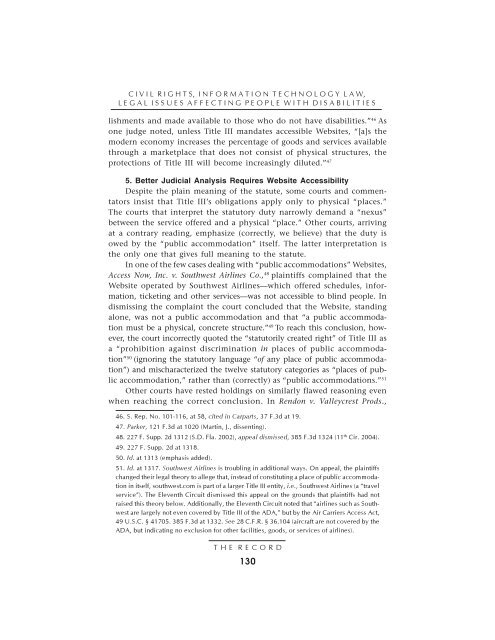2007 Issue 1 - New York City Bar Association
2007 Issue 1 - New York City Bar Association
2007 Issue 1 - New York City Bar Association
You also want an ePaper? Increase the reach of your titles
YUMPU automatically turns print PDFs into web optimized ePapers that Google loves.
C I V I L R I G H T S, I N F O R M A T I O N T E C H N O L O G Y L A W,<br />
L E G A L I S S U E S A F F E C T I N G P E O P L E W I T H D I S A B I L I T I E S<br />
lishments and made available to those who do not have disabilities.” 46 As<br />
one judge noted, unless Title III mandates accessible Websites, “[a]s the<br />
modern economy increases the percentage of goods and services available<br />
through a marketplace that does not consist of physical structures, the<br />
protections of Title III will become increasingly diluted.” 47<br />
5. Better Judicial Analysis Requires Website Accessibility<br />
Despite the plain meaning of the statute, some courts and commentators<br />
insist that Title III’s obligations apply only to physical “places.”<br />
The courts that interpret the statutory duty narrowly demand a “nexus”<br />
between the service offered and a physical “place.” Other courts, arriving<br />
at a contrary reading, emphasize (correctly, we believe) that the duty is<br />
owed by the “public accommodation” itself. The latter interpretation is<br />
the only one that gives full meaning to the statute.<br />
In one of the few cases dealing with “public accommodations” Websites,<br />
Access Now, Inc. v. Southwest Airlines Co., 48 plaintiffs complained that the<br />
Website operated by Southwest Airlines—which offered schedules, information,<br />
ticketing and other services—was not accessible to blind people. In<br />
dismissing the complaint the court concluded that the Website, standing<br />
alone, was not a public accommodation and that “a public accommodation<br />
must be a physical, concrete structure.” 49 To reach this conclusion, however,<br />
the court incorrectly quoted the “statutorily created right” of Title III as<br />
a “prohibition against discrimination in places of public accommodation”<br />
50 (ignoring the statutory language “of any place of public accommodation”)<br />
and mischaracterized the twelve statutory categories as “places of public<br />
accommodation,” rather than (correctly) as “public accommodations.” 51<br />
Other courts have rested holdings on similarly flawed reasoning even<br />
when reaching the correct conclusion. In Rendon v. Valleycrest Prods.,<br />
46. S. Rep. No. 101-116, at 58, cited in Carparts, 37 F.3d at 19.<br />
47. Parker, 121 F.3d at 1020 (Martin, J., dissenting).<br />
48. 227 F. Supp. 2d 1312 (S.D. Fla. 2002), appeal dismissed, 385 F.3d 1324 (11 th Cir. 2004).<br />
49. 227 F. Supp. 2d at 1318.<br />
50. Id. at 1313 (emphasis added).<br />
51. Id. at 1317. Southwest Airlines is troubling in additional ways. On appeal, the plaintiffs<br />
changed their legal theory to allege that, instead of constituting a place of public accommodation<br />
in itself, southwest.com is part of a larger Title III entity, i.e., Southwest Airlines (a “travel<br />
service”). The Eleventh Circuit dismissed this appeal on the grounds that plaintiffs had not<br />
raised this theory below. Additionally, the Eleventh Circuit noted that “airlines such as Southwest<br />
are largely not even covered by Title III of the ADA,” but by the Air Carriers Access Act,<br />
49 U.S.C. § 41705. 385 F.3d at 1332. See 28 C.F.R. § 36.104 (aircraft are not covered by the<br />
ADA, but indicating no exclusion for other facilities, goods, or services of airlines).<br />
T H E R E C O R D<br />
130

















